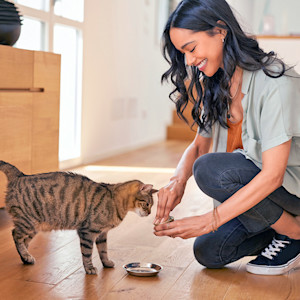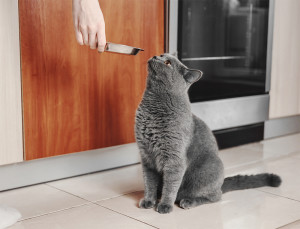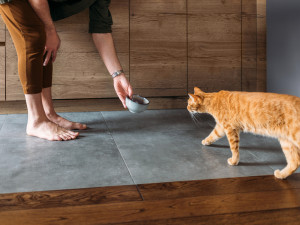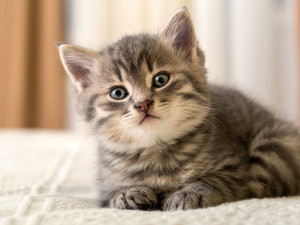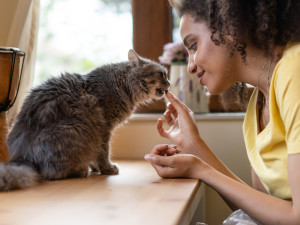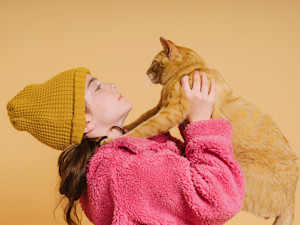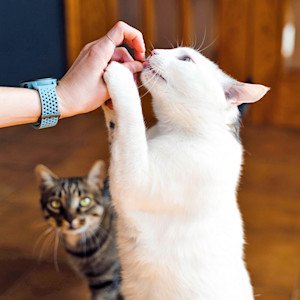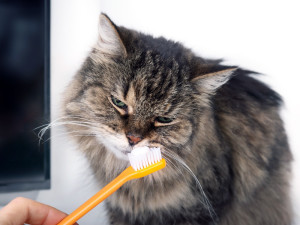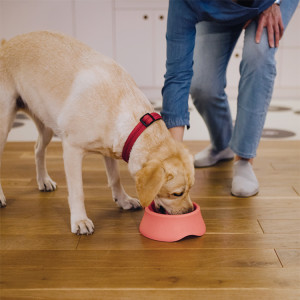How Long Can Wet Cat Food Sit Out?
Your new cat certainly isn’t going to have the answer.

Share Article
In This Article:
How Long Should Wet Cat Food Sit Out? Why Does Wet Cat Food Spoil? Why Doesn’t Your Cat Finish Their Food?
There are many benefits to feeding your cat canned food diets, but the one downside to wet cat food is that it cannot sit out at room temperature indefinitely. Wet food is often recommended by veterinarians for a variety of reasons, and it is a good idea to introduce it to your cat early on to prevent picky eaters later.
Be sure to follow the guidelines on your cat’s food as far as how much to feed, how often, and how to properly handle and store the food to keep it fresh and safe for kitty consumption.
How long should wet cat food sit out?
As a general rule, canned or wet cat food should not sit out at room temperature for longer than four hours, but in many cases, a shorter window of time may be more optimal. Canned cat food is typically prepared by cooking the ingredients and sealing them within the can. This creates a sterile environment allowing the food to be protected from germs and to be shelf stable for long periods of time.

As soon as the can is opened, though, microbes from the environment come into contact with the food and this can lead to spoilage and the introduction of potential pathogens as time goes on. So, the longer the food sits out at room temperature, the more risk. If the food is in a warmer environment such as outdoors on a hot day, or in a room that is not temperature-controlled, this safe window shrinks to even less time as certain germs can flourish more quickly in warmer temperatures.
On the contrary, if you are feeding cats outdoors on cold days, the food may be safe for a little bit longer; many germs do not fare well in the cold. This is why it is also very important to refrigerate unused portions of food right away in order to keep them fresh for another meal.
How long should wet cat food sit out mixed with dry food?
If canned food is mixed with fresh dry food, this does not have a major impact on the rate of spoilage, and it is important to stick with the same guidelines. However, it is possible that if the dry food is not stored properly, it may be more likely to carry unwanted microbes and may speed up the rate of spoilage when mixed with canned food.
Proper storage of dry food means that the food is kept in a clean, sealed container away from extreme temperatures and moisture. It is also a good idea to keep the original bag in order to have important information regarding the lot and serial numbers in case of a recall or adverse reaction from your pet.
How long can wet cat food sit out covered?
Even if you cover the canned food, it should not sit out at room temperature for more than four hours. This is because as soon as the can is opened and the food is exposed to the air, microbes can enter the food.
Many microbes are harmless, but the longer they have access to the food at room temperature, the more they can multiply and potentially cause spoilage or introduce harmful germs to your cat. The best scenario is to cover the leftover food and place it into the refrigerator as soon as possible, and at least within four hours of opening it.
What should you do with leftover canned cat food?
Leftover canned cat food should be covered, labeled with the date it was opened, and placed in the refrigerator within four hours. This allows the food to stay fresh as long as possible so it can be portioned out for additional meals. An open can of cat food that is properly covered and refrigerated can be safely used for up to three consecutive days, after which time any remaining leftovers should be discarded.
When you feed your cat canned food, any food left over in their bowls after the meal or after a maximum of four hours, should be discarded and the bowls should be washed before the next meal. Canned food should not be left out for long periods of time such as the whole work day or overnight. The longer the food is left out, the more likely it will start to spoil or become contaminated with potentially harmful germs that can make your cat sick.
Additionally, cats are such meticulous creatures that they will likely snub their nose at old food that has been sitting out for a while; usually it will start to harden and dry out on top and may have a different texture, smell, or taste which may turn them off.
Why does wet cat food spoil?
All food has the potential to spoil because of the microbes all around us and the local environmental conditions. Spoilage is the process of food breaking down and becoming unsafe to eat. This is usually a result of contamination from bacteria or fungal spores from the environment.
Other factors that can make food spoil are environmental conditions, such as drying out, food getting damaged by freezing or heating, and food becoming discolored or changing in texture over time. Additionally, when cats eat some of the food in their bowl, the microbes from their mouths are introduced into the rest of the food as well. This can also contribute to spoilage. The process of canning food helps to cut down on all of these factors by sealing the ingredients in the can to create a sterile, stable environment. Once that top is popped, however, all of these factors come into play and will influence the freshness of the food.
Should wet cat food be refrigerated?
Wet cat food certainly has the potential to spoil just like any other food. Given the way it is prepared, once a can is opened, it no longer has the protections that kept it fresh and stable at room temperature. Thus, all canned and wet foods should be refrigerated after they are opened.
Make sure your refrigerator is set to 40 degrees Fahrenheit or belowopens in new tab to adequately slow the growth of bacteria. It is important to keep the food covered and label it with the date of opening to keep it as fresh as possible and keep track of when to discard it. Even if it is kept covered and refrigerated, the opened cans of cat food should be discarded after three days.
And while keeping the food refrigerated is the best way to keep canned cat food fresh, your cat may not be a fan. Many cats prefer food served at room temperature or slightly warmed up, so if your cat is snubbing their cold food, you might want to try warming it up before serving.
Why doesn’t your cat finish their food?
If your cat doesn’t finish their food, there could be many possible explanations. Any time there is a sudden change in your cat’s appetite, it is important to consult a veterinarian as this may be a sign of a medical problem. Some other considerations are:
Type of cat food
There are so many options out there for cats and you may find that your cat has a preference for certain textures, flavors, or styles of food. If you are finding your cat’s appetite lackluster, you may want to experiment with introducing a few new variables into their diet. In general, it is a good idea to offer cats some variety when it comes to flavors and textures of food, especially kittens, to prevent them from becoming too picky. This will help your cat adjust to diet changes later in life if they need to switch for medical reasons as well.
Boredom in cats
Cats are natural hunters, so eating their food from a bowl once or twice a day may be boring for them. Cats who have to hunt for their food spend the majority of their day stalking, chasing, and hunting their prey, and they may catch many small meals throughout the day. This takes up most of their time, keeps them mentally and physically challenged, and results in small frequent meals.
If you have an indoor cat, it takes more effort to mimic these patterns and provide the mental and physical enrichment your cat really needs. Be sure to play with your cat every day and consider interactive toys, climbing structures, and food puzzles as ways to counteract boredom.
Stress in cats
Stress in cats can manifest in many different ways. Some cats hide when they feel stressed out while others may decide to pee in your shoe, over groom their fur, attack their housemates, or stop eating.
Stress can come from many sources, too. A move to a new home, in change to their routine, new family members (human, scaly, or furry), construction in the house, or even the loss of a human or pet in the home can be stressful to your cat. If it seems to be affecting your cat’s appetite, be sure that they have a safe, quiet place to eat such as a room that is sealed off to any other pets or people, and consider feeding them high up on a shelf or counter where other pets cannot bother them. You can also invest in products like pheromone diffusers and hidey boxes to give your cat some relief. If your cat skips meals for 24 hours, be sure to contact your vet as they may need additional support to get them through a rough patch.
Feeding style
As active hunters, cats who normally catch their own meals may eat up to ten small prey per day. And while most of us don’t have the time to prepare ten meals for our cats each day — despite their haughty demands! — we can try to replicate this style of feeding to some degree. Many cats will do best when fed small, frequent meals throughout the day instead of just one or two large meals. This can also help prevent them from overeating.
In general, make sure you offer appropriate portion sizes, too. If your cat is routinely leaving food over and there are no other reasons to suspect a problem, it may be that they are simply being overfed.
Illness
It is important to always take note of shifts in your cat’s appetite, as well as any other changes in their behavior or overall health. If they have a sudden change in their appetite, especially if it is accompanied with any other signs, it is important to have them checked out by a vet. Cats tend to hide health problems even from their favorite people, so sometimes subtle cues are the only sign of a problem.
FAQs (People also ask):
How quickly does wet cat food spoil?
As soon as a can of cat food is opened, it is exposed to microbes and environmental conditions that start to affect its freshness. At room temperature, moist food should be discarded after four hours or less.
Can I leave cat food out overnight?
You should not leave canned or moist cat food out overnight as these foods are likely to spoil if left at room temperature for so many hours. If you need to leave food available to your cat for more than four hours, dry kibble may be a safer option.
How often should I feed my cat?
Most cats respond best to small, frequent meals so depending on your schedule and your cat’s needs, you can try to offer multiple small meals throughout the day with a minimum of two to three meals per day.
References:

Dr. Amy Fox, DVM
Amy Fox, DVM is a small animal veterinarian in New York City with over thirteen years of experience in a mixture of general practice, emergency medicine, and shelter medicine. A lifelong animal lover, Dr. Fox studied biology in college and then worked as a veterinary nurse before pursuing veterinary school at Cornell University. Her expertise includes surgery, dentistry, and management of chronic conditions, and she is interested in toxicology, pain management, nutrition, care of senior pets, and educational outreach. Dr. Fox also enjoys writing about veterinary medicine and teaching, and her work has previously appeared in Spruce Pets. In her free time, she loves to cook, garden, go for long runs, and hang out with her goofy mixed-breed dog May, who provides never ending comic relief!
Related articles
![woman feeding cat a treat]()
How Many Treats Is Too Many For Your Cat?
Despite what your cat thinks, jerky treats all day, every day, is not the answer.
![Woman playing with her orange cat.]()
Why Does My Cat’s Breath Smell?
Oof, that is bad.
![Person feeding a couple of cats at home.]()
New Research Finds the Flavor of Food Cats Actually Want to Eat
Cats are notoriously picky, but science is getting to the bottom of their tastes.
![Curious cat sniffing on toothpaste on toothbrush held by pet owner.]()
How to Brush Your Cat’s Teeth
It sounds like a daunting task, but here are some helpful steps to take.
![Portrait of a Labrador dog eating from a pink bowl.]()
Pet Food Recalled After Testing Positive for Salmonella and Listeria
This was a voluntary recall by the company itself.

